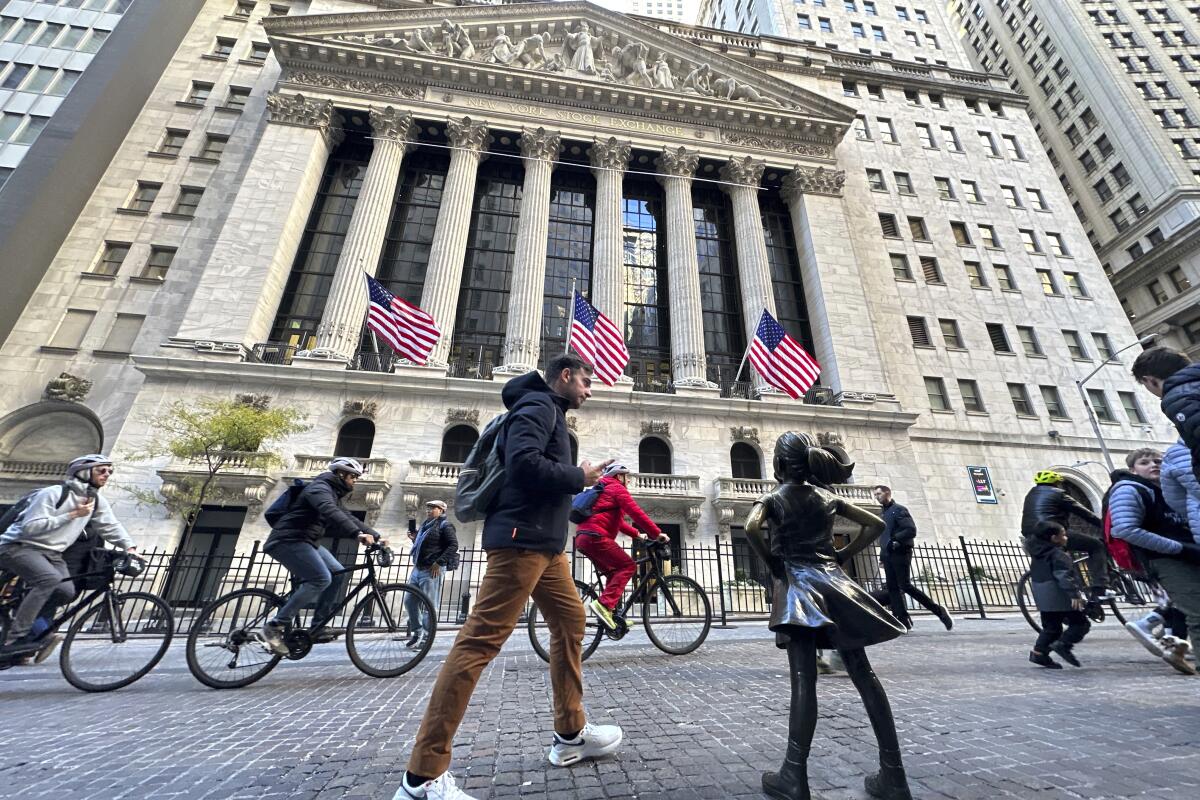Wall Street drifts to a mixed close, weighed down by Big Tech

Wall Street capped a choppy day of trading with a mixed finish Wednesday as a late-afternoon pullback among several Big Tech companies offset gains elsewhere in the market.
The Standard & Poor’s 500 index closed 0.1% lower after having been up by 0.7% earlier in the day. The Dow Jones industrial average had been up 0.5% before finishing with a gain of just 0.1%. The tech-heavy Nasdaq composite fell 0.2%.
Facebook parent company Meta fell 2%, Google’s parent company Alphabet gave up 1.6% and Microsoft dropped 1%.
Still, gainers outnumbered decliners by a nearly 2-to-1 margin on the New York Stock Exchange.
Automakers were among the bright spots. General Motors surged 9.4% after the company announced a big stock buyback, raised its dividend and told investors that it won’t have any trouble absorbing the costs of its new labor contract. The stock is still down 6.1% for the year, while the S&P 500 is up more than 18%.
GM and its rivals agreed to new contracts with the United Auto Workers and Canadian auto workers in late October following strikes that lasted more than a month.
Ford rose 2.1% and Jeep maker Stellantis rose 5.3%.
All told, the S&P 500 fell 4.31 points to 4,550.58, the Dow rose 13.44 points to 35,430.42, and the Nasdaq dropped 23.27 points to 14,258.49.
Stocks rose in Europe and were mixed in Asia.
Charles Munger started as an L.A. lawyer before becoming Warren Buffett’s billionaire investment partner.
Treasury yields fell, taking more pressure off of stocks. The yield on the 10-year Treasury, which influences mortgage rates, slipped to 4.26% from 4.33%. The yield on the two-year Treasury fell sharply to 4.66% from 4.75%.
Wall Street also received an encouraging economic update. The U.S. economy grew at a brisk 5.2% annual pace from July through September, the government reported Wednesday, an upgrade from its previous estimate of 4.9%.
The revision helps give more credence to the argument that a recession was always unlikely in 2023, said Jamie Cox, managing partner for Harris Financial Group. Fears about a recession have been waning throughout the year amid strong economic reports.
“Below the surface though, you’re starting to see some cracks in the data,” he said. “Consumer spending having a negative impact on GDP is an unusual circumstance.”
Consumer spending, the lifeblood of the economy, rose at a 3.6% annual rate from July through September. That’s still healthy, but a downgrade from the previous estimate of 4%.
The report came after an encouraging survey on consumer confidence released Tuesday.
U.S. shoppers spent $12.4 billion on Cyber Monday, a record result demonstrating the continued resilience of consumers despite dwindling pandemic-era savings.
The broader economy has remained resilient partly because of strong consumer spending, despite lingering pressure from inflation. Wall Street will be closely watching retailers as they move through the important holiday shopping season. A record 200.4 million consumers shopped online and in stores over the holiday weekend, according to the National Retail Federation.
Sneaker and athletic apparel retailer Foot Locker rose 16.1% after reporting strong third-quarter earnings and giving investors an encouraging update on its financial forecast. Several other big retailers also gained ground. Nike rose 1.5% and Lululemon Athletica rose 2.5%.
Investors will get another key economic update Thursday when the government releases its October data on the Federal Reserve’s preferred measure of inflation. Economists expect that measure to continue easing, as it has been since the middle of 2022. The Fed will meet again in December to update its interest rate policy.
Wall Street expects the Fed to keep its benchmark interest rate steady and is betting that it is finished hiking rates, which remain at their highest levels in two decades. The central bank has said it will base future rate decisions on the latest economic data, though recent statements from officials have boosted hopes that the most aggressive round of rate hikes is at an end.
Christopher Waller, a member of the Fed’s Board of Governors, signaled Tuesday that the central bank probably is finished raising rates and could cut rates as early as spring. Wall Street is betting that the Fed will start cutting rates by the middle of 2024.
Several stocks rallied Wednesday after delivering strong financial updates. NetApp jumped 14.6% after easily beating analysts’ forecasts for earnings in its latest quarter and raising its outlook for the year. TurboTax maker Intuit rose 2.2% and software maker Workday gained 11% following encouraging results and forecasts.
On the losing end was Spam maker Hormel foods, which fell 4.6% after giving investors a weak profit forecast.
Meanwhile, Las Vegas Sands slid 4.9% after Miriam Adelson, the casino operator’s controlling shareholder, sold some $2 billion in stock. The move came ahead of an announcement Wednesday that Adelson’s family has agreed to buy a majority stake in the Dallas Mavericks NBA franchise, which is owned by Mark Cuban.
AP writer Paul Wiseman contributed to this report.
More to Read
Inside the business of entertainment
The Wide Shot brings you news, analysis and insights on everything from streaming wars to production — and what it all means for the future.
You may occasionally receive promotional content from the Los Angeles Times.












